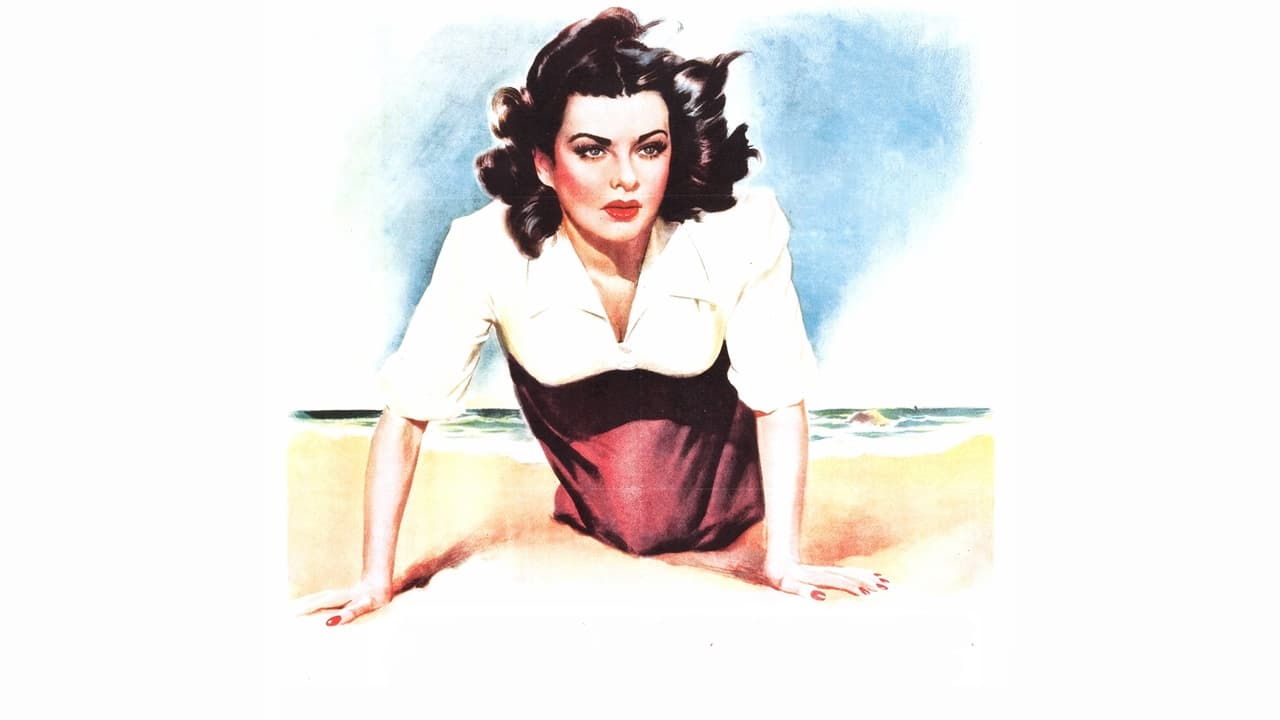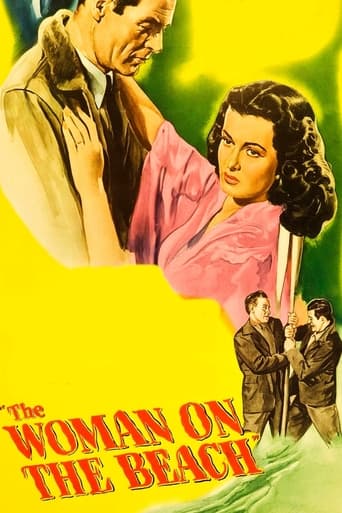

A film of deceptively outspoken contemporary relevance, this is cinema at its most alert, alarming and alive.
... View MoreGreat story, amazing characters, superb action, enthralling cinematography. Yes, this is something I am glad I spent money on.
... View MoreStory: It's very simple but honestly that is fine.
... View MoreI think this is a new genre that they're all sort of working their way through it and haven't got all the kinks worked out yet but it's a genre that works for me.
... View MoreThe Woman on the Beach (1947)An interesting psycho-drama. The plot is a contrivance, limited to one general scene on an ocean beach, where a soldier (Robert Ryan) is struggling with terrible memories of the war. He is apparently in love with one woman but then he meets a far more beguiling and mysterious woman (Joan Bennett), already married to a man who has recently gone blind.So there are the four characters. Each is loaded with qualities that are plain to see and that guide their decisions in extreme ways. Ryan, as an actor, is not to everyone's taste, but he has grown on me over the years. The stiff posture and equally stiff verbal delivery is laced with feeling, like he's constantly wound up too tight. That's perfect here for a man still tormented by violent dreams and uncertainty in his lonely life. Bennett plays a kind of woman who isn't quite femme fatale because she isn't quite manipulating Ryan without his knowing, but she has a sinister look and tone to her voice that's terrific. It turns out she hates her husband, not having to do with his blindness, but because he's cruel to her. So it naturally occurs to both Ryan and Bennett in different ways that the blind husband might be dispensable somehow, even if neither is quite prepared for murder.The husband is given an earthy, almost admirable quality that is wonderfully at odds with how he treats Bennett. And the fourth leading character, the sweet woman who is slowly seeing Ryan slip out of her future, is the one symbol of straight forward simplicity and honesty. There are scenes along the cliffs, on the stormy waters, at night in the grasses, and in a shipwrecked hull. You feel sometimes that it's almost a play, scripted tightly (too tightly) and staged in a limited physical world (with even the ocean scene seeming constrained in space). But this works, in a way, because you know it's a study of sorts, not a slice of real life. The one real flaw is having the blind man just too able to walk and do things without his eyes, never stumbling, never missing by an inch something he's reaching for.This movie was a surprise in many ways. I haven't seen one quite like it, and Ryan and Bennett are really both vivid and strangely deep. If the end leaves you unsatisfied, you're not alone. It's too easy, and it shows no psychological insight after all the probing and groping prior. Even so, it's strong enough to work as a stylized piece, an artifice with bits of truth tucked in the edges.
... View MoreYou'd think that a film starring Joan Bennett, Robert Ryan and Charles Bickford would be far better. For one thing, Bickford, already in 1947, looked far too old to play Bennett's blinded painter husband. Ryan is a coast guard officer who falls for Bennett and at the same time suspects that Bickford is feigning his blindness. That would have been a great premise to stick to, but it didn't and the picture may have suffered as a result.Ryan allows Bickford to fall off a rock and the two battle on a raft during a ferocious storm. Amazingly, there are no fatalities, which in itself is ridiculous.When I saw the ending, I thought that they would be bringing in Mrs. Danvers from "Rebecca," and even that scene ended in what many might view as a cop out.
... View More***SPOILERS*** Shell shocked as well as water logged navy man Let. Scott Brunnet, Robert Ryan, has never gotten over his experience in WWII when his ship was hit by a German undersea mine and sank. Trying to get his head together Scott in charge of a Coast Guard station on the Atlantic coast takes daily rides along the beach on his horse and one day runs into Peggy, Joan Bennett, picking up woods from an abandoned ship wreck. During a friendly talk with her Peggy, as if she were psychic, has the surprised Scott analyzed down to the tee about his past and the hang-ups he developed from his WWII experiences.Invited into Peggy's home Scott finds out, when he shows up unexpectedly, that her husband Tod, Charles Brickford, is a world renowned artist as well as being blind. Tod takes an immediate liking to Scott almost inviting him to stay overnight even though he has to report back to his Coast Guard station within the hour. It's then that the film takes on an almost surreal look with Scott becoming so obsessed with Peggy that he virtually leaves his totally crazy about him girlfriend Eve,Nan Laslie, at the altar and falls crazily in love with Peggy, a married woman.The relationship between Peggy and Tod is by far the most interesting element in the film with her feeling guilty for the condition that he found himself in. We, and Scott, find out from Peggy that she go into a drunken fight with Tod and broke a bottle over his head resulting in him ending up blind. It's the fact of Tod's blindness that Peggy stayed and put up with his abuse of her feeling guilty that she took away the one love that he had in the world; eyes to both see and paint with.The rest of the film has Scott and Tod play this weird game of chicken with Scott trying to prove that Tod isn't really blind in order to free Peggy from his clutches and keep her all for himself. Scott's actions are so outrageous that he almost has Tod killed twice in the film, by falling off a cliff and drowning in an Alantic storm, the second time with Scott almost getting killed along with.Tod soon realizes that it's his paintings that has him going somewhat insane with his obsessive actions towards both them and Peggy and finally decides to burn them in order to set himself and Peggy free. Being blind Tod in trying to set the painting on fire sets his and Peggy's house on fire as well leaving himself homeless and penniless with only the clothes, and his car, on his back. The film ends with Peggy realizing that Tod needs her more then ever leaves Scott standard on the beach, watching her and Tod's house burn to a crisps, and agree to drive back with Tod to New York to start a new life. As for Scott we can assume that he'll now go back to Eve whom he promised to marry earlier in the movie, that's if she'll be willing to take him back in the first place.
... View MoreAfter sitting through this film in total bemusement I turned to the eight comments posted here in search of anything that may help me make sense of it. There seems to be a consensus that Renoir suffered a touch of the Orson Welles' inasmuch as a potential masterpiece was butchered by the studio. There may be grounds for asserting the studio did in fact cut the film extensively but I could detect no evidence whatsoever that this was a potential Magnificent Ambersons. I'm an admirer of Renoir but I had to work awfully hard to detect his hand in even one frame of this noir manque. By coincidence I saw it within 24 hours of another noir film set largely out of doors in daylight and made by a Frenchman albeit set in America but Jacques Tourneur's Build My Gallows High is light years ahead of this whilst compared to Renoir over the long haul Tourneur is very much second-string. Like Gallows the protagonist - respectively Robert Mitchum and Robert Ryan - begins his cinematic life betrothed to a wholesome Doris Day substitute but is soon seduced by a femme fatale - Jane Greer and Joan Bennett - but that's about as far as comparison will take us. Unlike Gallows Renoir never permits the noir world to fully intrude and eclipse the healthy environment in which the protagonist is discovered so that we're constantly reminded of 'normal' life even as Ryan is drawn deeper and deeper into the whirlpool surrounding Bennett and her blind painter - a very crude metaphor for impotence - husband Charles Bickford. All three principals give it their best shot but the problem was they never knew which target - thriller, suspenser, drama, melodrama - they were aiming at.
... View More